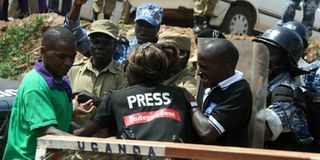May we have the courage to use our critical minds

What you need to know:
This year Unesco wants us to examine the “interrelationships between freedom of expression, justice for all and the rule of law, peace, and inclusiveness”. Can Ugandan media deliver? Or, for that matter, can Uganda deliver?
Media is a big deal. How much of a big deal? Unesco suggests it is a very big deal.
“Critical Minds for Critical Times: Media’s role in advancing peaceful, just and inclusive societies.” Themes don’t come as intimidatingly grand as this year’s overall theme for World Press Freedom Day to be marked on May 3. But that’s what Unesco crafted.
The sub-themes are: justice for all as a prerequisite for freedom of expression and sustainable development; promoting the media’s potential as a catalyser of peace and mutual understanding; and freedom of expression and freedom of information foster more inclusive societies.
Unesco is thinking about SDG 16, which is primarily about promotion of “peaceful and inclusive societies for sustainable development”, provision of “access to justice for all” and building “effective, accountable and inclusive institutions at all levels”.
Put another way, this year Unesco wants us to examine the “interrelationships between freedom of expression, justice for all and the rule of law, peace, and inclusiveness”.
Can Ugandan media deliver? Or, for that matter, can Uganda deliver?
Where to start but by pointing out the obvious: that the present jailing of Dr Stella Nyanzi is an obscene act by the State against a citizen.
Stopping public use of lewd language, especially when directed at “accountable” power, should not be the business of the State. It should be left to society to censure the user of the “offending” language. It is social not State sanction that matters. Let Dr Nyanzi’s family, friends, peers and other ordinary citizens be the ones to condemn her speech. Fear of losing the respect of dear ones more likely produces better results.
By calling in the police, the Judiciary, the prisons, the intelligence agencies, the State has turned Dr Nyanzi, according to Amnesty International, into a “prisoner of conscience, held solely for exercising her right to freedom of expression”.
All because she used more than colourful language to criticise President Museveni on his empty campaign promise to supply poor school-going girls with sanitary towels. But how should a concerned citizen challenge entrenched power? Anyhow, it is unlikely that Dr Nyanzi will change her style once out of jail. (Good job, guys.)
Uganda cannot be a just society when it promises education to its children and then sits back when a large number of them drop off for reasons we know and we know we can address, but those amongst us with State responsibility instead play electoral politics over. Then when we are called out we lash out.
Yet education, good education, for all should be a key factor in building inclusivity. Without real inclusivity, without all Ugandans feeling they are part of a good present and a better future, we cannot possibly talk about sustainable peace and sustainable development.
The media, of course, cannot be a catalyser of the good things when it operates in a restrictive environment, in an environment that declares certain topics and certain language (unless it is hate speech) no-go areas.
In reports released a few days ago, the two key trackers of media freedom in the world — Freedom House and Reporters Without Borders — both show Uganda sliding in rankings.
To change things, the media has to fight. For the media to be successful, and the Uganda media has been in striking down the false news and sedition laws, it requires the rest of the pro-clean government actors to keep fighting hard as well. For example, we still need to achieve justice for all (not just for the well-connected and wealthy) and rule of law in Uganda. We need to act more as citizens not subjects.
The media’s role in helping affirm the important things (inclusive growth) and challenge the bad ones (abuse of power) is primarily the responsibility of media actors. But it is also the responsibility of overall society.
Easy access to accurate and timely information in the hands of the State is not just good for media people. It is also good for every citizen and therefore for informed and active citizenry. We are in this together, people.
According to Unesco, every year, May 3 is a date on which to celebrate the “fundamental principles of press freedom; to evaluate press freedom around the world, to defend the media from attacks on their independence and to pay tribute to journalists who have lost their lives in the exercise of their profession”.
In Uganda this Wednesday, some of us will be asking for the immediate and unconditional release of Dr Nyanzi. Regardless of her salty language, it is absurd that she is in jail this May 3, or at all. Need I add that Dr Nyanzi’s first degree (at Makerere) was in journalism.
This World Press Freedom Day, and every day, may we have the courage to use our critical minds. The times they demand it.
Mr Tabaire is the co-founder and director of programmes at African Centre for Media Excellence in Kampala.
[email protected]
Twitter:@btabaire




